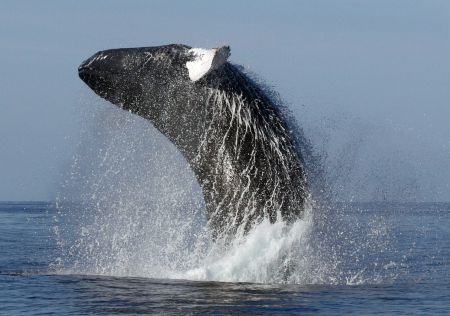KJIPUKTUK (Halifax) - It would appear whales in the North Atlantic are adapting to climate change faster than we are.
A study 27 years in the making has shown a dramatic shift in the migrations of fin and humpback whales in Atlantic Canadian waters. Calling on their research from 1984-2010, the Mingan Island Cetacean Study (MICS) discovered these whales have arrived at their feeding grounds in the Gulf of St Lawrence, on average, one day earlier each year. This has culminated in an unprecedented one month shift in their seasonal migration over the lifetime of this study.
Christian Ramp, a head author of the study and long time member of MICS, said these results demonstrate the importance of long term research, because it exposes trends which might otherwise have been missed. A migrational shift of this magnitude, to Ramp’s knowledge, has never been observed in another species on this short a timeline. The reason behind this shift is apparent - climate change.
Ocean temperatures have been on the rise in recent years, climbing approximately 2 degrees C in the Gulf of St Lawrence, said Ramp. This is the result of our warming climate and, among other things, is causing the winter ice covering the Gulf to melt earlier than it did historically. The consequences of this premature melting are numerous.
With sunlight reaching the exposed ocean water earlier each year, phytoplankton blooms arrive early also, which herald early zooplankton blooms and finally fish like capelin and herring devour their zooplankton prey. Fin and humpback whales, which eat both fish and zooplankton, are rushing to their feeding grounds earlier and earlier, lest they miss the buffet.
“This one month shift over about 30 years is actually amazing,” said Ramp. “These animals, in the North Atlantic at least, have shown a huge resilience and have been really good to adapt.”
Both fin and humpback whales have swam the North Atlantic for millions of years, said Ramp, even during the last ice age when the Gulf of St Lawrence was ice-covered year round and was thus not accessible to them.
“They have been very successful adapting to past climatic changes, which is of course a help to them now,” said Ramp. “The question is, how far can they push it?”
Unfortunately, climate change isn’t the only pressure we’ve imposed on these animals. Water contamination, underwater noise pollution and competition for food with the Atlantic Canadian fisheries are all factors which, combined with a changing climate, could cause serious problems for these two species of whale.
“I think the biggest threat of them all...is the cumulative affect of multiple threats,” said Ramp.
Fin whales are a pelagic species, meaning they roam the open ocean rather than hugging the coast and are therefore difficult to study. They have proven themselves hardy, however, not being as dependent on a north-south migration as other whale species and they’re capable of covering huge distances, thanks to their sheer size. This could make them more resilient in the face of climate change, suggested Ramp. That being said, MICS has estimated there are only 330 fins still visiting the Gulf of St Lawrence and their population, once devastated by whaling, has yet to fully recover. Moreover, dozens of these fin whales have been reported dead in recent years. Under the Species At Risk Act (SARA), they are listed as a “species of special concern.”
“We’re worried the population actually isn’t doing that well,” said Ramp.
Humpbacks, however, have made encouraging strides toward recovery in Atlantic Canada, losing their “special concern” status in 2003. However, as a species heavily dependent on their north-south seasonal migration, the trend discovered by MICS could take its toll on these whales, as they’re forced to travel farther and farther north in pursuit of their retreating prey.
“[This study is] another indication of a fast changing environment,” said Ramp. “It’s amazing how these whales have so far been able to adapt, but there are limits.”



